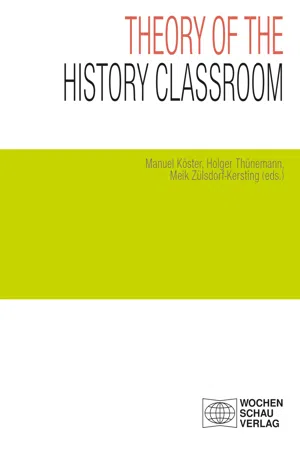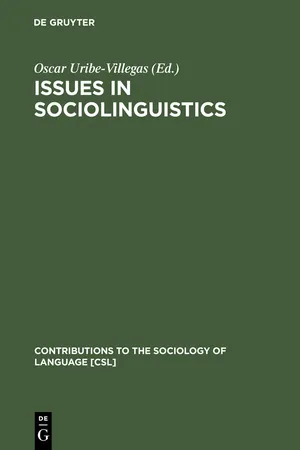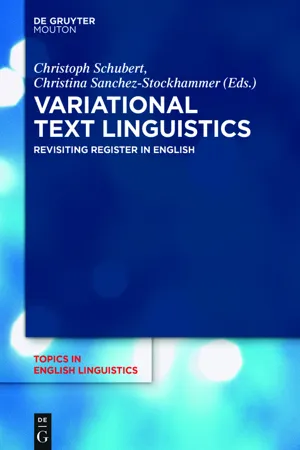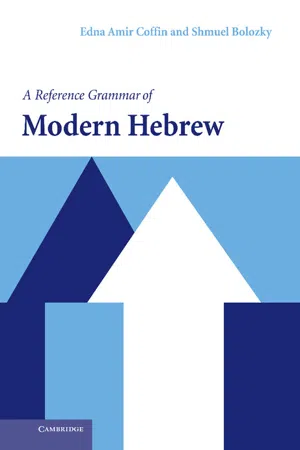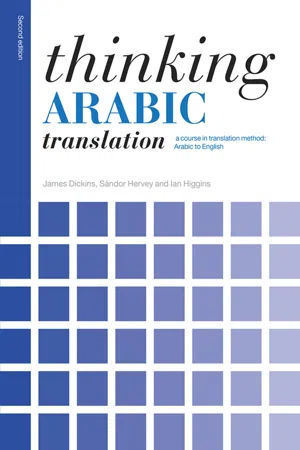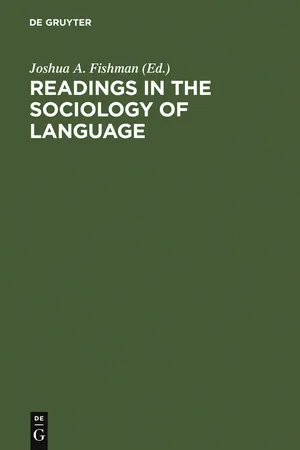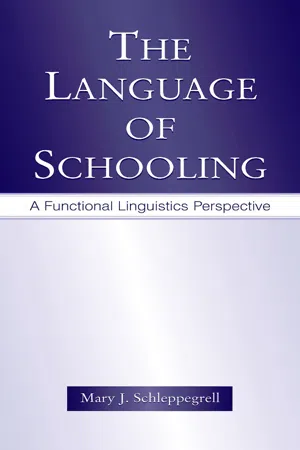Languages & Linguistics
Casual Register
Casual register refers to the style of language used in informal, relaxed, or familiar settings. It often includes colloquial expressions, slang, and a more relaxed grammar and pronunciation. This register is typically used in everyday conversations among friends, family, and peers, and is characterized by its lack of formality.
Written by Perlego with AI-assistance
Related key terms
1 of 5
9 Key excerpts on "Casual Register"
- eBook - PDF
- Manuel Köster, Holger Thünemann, Meik Zülsdorf-Kersting(Authors)
- 2022(Publication Date)
- Wochenschau Verlag(Publisher)
In the following, we examine the registers most relevant to history in the classroom . We draw these from different, largely unconnected research contexts and branches of historiography, education and linguistics . These different disci-plinary approaches (with their own traditions and identities) have not yet been cross-referenced systematically and analytically . While the discourses involved are not always easy to combine, attempting to do so sheds new light on the lin-guistic dimensions of history in the classroom, which to date have at best been examined in isolation . 7.2.1 Casual Register Casual Register is the range of standard language used in everyday communica-tion (as opposed to “educated” English, technical register or specific language used e . g . by young people; cf . Glück 2004, 31) . Colloquial language is often described as the main variety of Casual Register because it is assumed to be typi-cal of specific speech situations, rather than determined by social class (ibid .) . Colloquial language is primarily spoken – although it is used to communicate online and through messaging services – and hence mainly a “speech form of immediate contact” (ibid ., 757) . In his research into the processes involved in acquiring a second language, Jim Cummins (2004) distinguishes basic interpersonal communication skills (BICS), used to communicate in situations that are cognitively less demanding and strongly embedded in specific contexts, from cognitive academic language pro-ficiency (CALP) . The latter is required in cognitively sophisticated communica-tion where little reference is made to specific contexts (cf . Berendes et al . 2013, 20; Schmölzer-Eibinger 2013, 27) . Simply put, BICS enables communication in Casual Register, while CALP enables discourse in academic register . 7 Cf . “double contingency” ( → History in the classroom, 28; → Emotions, 122) and the three “improbabilities of successful communication” ( → Media, 157) . - eBook - PDF
- Oscar Uribe-Villegas(Author)
- 2014(Publication Date)
- De Gruyter Mouton(Publisher)
Different dialects of the same language may include different local varieties of the same language and also different social varieties (Ellis, 1965). Register, as we have said, is a norm that obtains in a particular language community. Since no two communities are entirely alike on the social plane, but each will have its own contacts, traditions and activities, we can predict that there will be different register repertories for each community (i.e., registers for a different range of social situations), even where these communities speak the same language. Indeed, with the major international languages, such as English (e.g., in U.K., U.S.A., and, for example, West Africa) or Spanish (as in Spain, Mexico, etc.) it is probably register differences, rather than any major differences in lexis and grammar, that provide the most striking difference within the one language. Register in descriptive linguistics and linguistic sociology 199 The study of register: Language events The object of register study is the language event: a social occasion on which a piece of language is produced. Each language event con-sists of text and context of situation. Knowledge of registers is arrived at by generalising from the study of a large number of language events and discovering what linguistic features are shared. Linguistic features (which may be of various kinds) are found by means of descriptive analysis (see below); contextual features are found by means of analysis of the particular context of situation ('immediate situation', Ellis, 1966a) and related to the register-use in terms which are already familiar to most linguists used to dealing with problems of style and meaning, such as formality and medium. - eBook - PDF
Text, Context and the Johannine Community
A Sociolinguistic Analysis of the Johannine Writings
- David A. Lamb(Author)
- 2014(Publication Date)
- T&T Clark(Publisher)
29 Halliday de ¿ nes dialect as ‘variety according to the user’ and register as ‘variety according to the use’. 30 Halliday’s understanding of register will be con-sidered in more detail below, alongside that of the American socio-linguist Douglas Biber. For both these scholars, the fundamental aspect of the register of a given text is that it carries with it signi ¿ cant informa-tion about its social context. 31 Indeed, ‘[t]he sensitivity of language to its 26 Crystal, Dictionary of Linguistics and Phonetics , p.409. 27 ‘Registers…when they are distinguished from styles, tend to be associated with particular groups of people or sometimes speci ¿ c situations of use. Journalese, babytalk, legalese, the language of auctioneers, race-callers, and sports commen-tators, the language of airline pilots, criminals, ¿ nanciers, politicians and disc jockeys, the language of the courtroom and the classroom, could all be considered examples of different registers. The term “register” here describes the language of groups of people with common interests or jobs, or the language used in situations associated with such groups.’ Janet Holmes, An Introduction to Sociolinguistics , (Harlow: Pearson Education, 2nd ed., 2001), p.246. Similarly, Wardhaugh states, ‘Registers are sets of language items associated with discrete occupational or social groups. Surgeons, airline pilots, bank managers, sales clerks, jazz fans, and pimps employ different registers’. Wardhaugh, Introduction to Sociolinguistics , p.51. 28 Ferguson draws a parallel between the systematic analysis of register varia-tions and ‘the extensive publications in German on Fachsprachen “occupational languages” and in English on “Language for Special Purposes” (mostly on commer-cial and scienti ¿ c registers of English)’. Ferguson, ‘Dialect, Register and Genre’, p.16. 29 Crystal, Dictionary of Linguistics and Phonetics , p.409. - eBook - PDF
Variational Text Linguistics
Revisiting Register in English
- Christoph Schubert, Christina Sanchez-Stockhammer, Christoph Schubert, Christina Sanchez-Stockhammer(Authors)
- 2016(Publication Date)
- De Gruyter Mouton(Publisher)
The follow-ing two quotations taken from standard introductions to sociolinguistics aptly demonstrate this narrow notion of “register”. Linguistic varieties that are linked […] to particular occupations or topics can be termed registers. […] Registers are usually characterized entirely, or almost so, by vocabulary differ-ences. (Trudgill 2000: 81) Register is another complicating factor in any study of language varieties. Registers are sets of language items associated with discrete occupational or social groups. Surgeons, airline pilots, bank managers, sales clerks, jazz fans, and pimps employ different registers . (Ward-haugh 2002: 51) It is obvious that subject matters connected to certain types of activity are respon-sible for the linguistic choices made by discourse participants in this type of approach to “register”. Although the second quotation includes the term “social groups”, this is conceptualized in a narrow way, excluding the language of social classes in the sense of working- or middle-class sociolects. In contrast to this narrow notion of “register”, a wide definition of the term is employed by the tradition of Systemic Functional Linguistics (SFL), as can be seen in the next two definitions taken from a classic introduction to cohesion and a recent study on register variation. The linguistic features which are typically associated with a configuration of situational fea-tures – with particular values of the field, mode and tenor – constitute a register. (Halliday and Hasan 1976: 22, emphasis original) Just as situations tend to recur and thus form types, registers represent recurring ways of using language in a given situation. […] Registers can thus be described as sub-systems of the language system or, when viewed from below, as types of instantiated texts reflecting a similar situation. - eBook - PDF
- Edna Amir Coffin, Shmuel Bolozky(Authors)
- 2005(Publication Date)
- Cambridge University Press(Publisher)
Literary register choice: colloquial informal language , , . , , . . , , , . (Opening segment from “How To Make A Good Script Great” by Etgar Keret ) Literary register choices: mixing registers Here is the last stanza of a poem written for children, that mixes both children’s and colloquial registers as one of its poetic devices: . ) ( There are several colloquial registers. When talking to family members speakers make some different choices than the ones they use when speaking either to neighbors and friends, or to colleagues or to total strangers. There are speech norms at work and at play. Adults may speak differently to children. Teenagers often have their own language codes and tend to address their contemporaries differently from the way they address their parents, teachers or other figures of authority. All of the above and many more situations determine choice of vocabulary, style, tone of voice, choice of language strategy, degree of directness and formality. Here are some illustrations: Direct Sit here! ! Polite Please, sit down. ! Formal polite (but insistent) Sit down, if you please. ! Chapter 15: Language in context 380 Polite suggestion You may sit. . Indirect suggestion You don’t have to stand. . 15.7.2 Register and metaphor One should not take it for granted that the use of metaphors automatically identifies a text as belonging to the literary register; slang makes extensive use of metaphors as well, and speakers whose speech typically belongs to one register may cross over to the other: when it is done in jest, or to impress with familiarity with the opposite register, or to achieve a special effect. Here are some metaphor groups that are used to the same semantic end in the two diametrically opposed registers, the literary register and slang. - eBook - PDF
Thinking Arabic Translation
A Course in Translation Method: Arabic to English
- James Dickins, Sándor Hervey, Ian Higgins(Authors)
- 2016(Publication Date)
- Routledge(Publisher)
For many other speakers, however, this style of lan-guage would be a function of tonal register; it is a form of language that they would only use when they were deliberately adopting a tone of formality and authority. Second, characteristics of particular social registers often include features of tonal register. ‘The boys done well’ said by a football manager to a television interviewer after a winning match not only re fl ects a social persona of the manager as ‘down-to-earth’ and ‘straight-speaking’ but is also an instance of a tonal register in which the manager presents himself as an authoritative but kindly father fi gure. In the case of Standard Arabic, it is easier to identify tonal register than it is to identify social register. The intrinsic formality of Standard Arabic makes it dif fi cult to establish clear links between the kind of language used and social stereotypes. In translating Standard Arabic into English, however, this does not mean that social register should necessarily be ignored. In order to achieve a form of English that is contextually acceptable, it may be necessary to impose a social register on the translation, even where there is no obvious social register in the ST. In cases where it is impossible to disentangle tonal and social register without lengthy analysis, it is acceptable for translation purposes simply to use ‘register’ as a cover term. 15.3 Sociolect We turn now to three language varieties that might be termed ‘sublanguages’, because they can, for some people, constitute a complete language (i.e. the only language variety they ever use). These are sociolect, dialect (‘geographical dia-lect’) and temporal variety (‘temporal dialect’). Whereas a social register belongs to a fairly narrowly stereotyped social per-sona, a sociolect is de fi ned in terms of sociological notions of class. A sociolect is a language variety typical of one of the broad groupings that together constitute the ‘class structure’ of a society. - eBook - PDF
- Joshua A. Fishman(Author)
- 2012(Publication Date)
- De Gruyter Mouton(Publisher)
The Users and Uses of Language 155 others in a shop than one involving lecturer and students in a university classroom. Which participant relations are linguistically relevant, and how far these are distinctively reflected in the grammar and lexis, depends on the language concerned. Japanese, for example, tends to vary along this dimension very much more than English or Chinese. There is even some formal difference in Japanese between the speech of men and the speech of women, nor is this merely a difference in the probabilities of occurrence. In most languages, some lexical items tend to be used more by one sex than the other; but in Japanese there are grammatical fea-tures which are restricted to the speech of one sex only. It is as the product of these three dimensions of classification that we can best define and identify register. The criteria are not absolute or independent; they are all variable in delicacy, and the more delicate the classification the more the three overlap. The formal properties of any given language event will be those associated with the intersection of the appropriate field, mode and style. A lecture on biology in a technical college, for example, will be in the scientific field, lecturing mode and polite style; more delicately, in the biological field, academic lecturing mode and teacher to student style. The same lecturer, five minutes later in the staff common room, may switch to the field of cinema, conversational mode, in the style of a man among colleagues. As each situation is replaced by another, so the speaker readily shifts from one register to the next. The linguistic differ-ences may be slight; but they may be considerable, if the use of language in the new situation differs sharply from that in the old. We cannot list the total range of uses. Institutional categories, unlike descriptive ones, do not resolve into closed systems of discrete terms. - eBook - ePub
Exploring the Spanish Language
An introduction to its structures and varieties
- Christopher Pountain, Christopher J. Pountain(Authors)
- 2016(Publication Date)
- Routledge(Publisher)
7Register
In Chapter 6 we looked at diatopic and diastratic variation in modern Spanish. In this chapter and the next we will consider what is sometimes called diaphasic variation. First of all we look at register, i.e. variation according to the situation in which language is used, or the purpose for which it is used. As with diatopic and diastratic variation, it turns out that such external circumstances can often be correlated with internal, structural features of language. Native speakers can make judgements about what is appropriate and inappropriate linguistically in a particular situation, an ability which is sometimes called communicative competence (Hymes 1974: 75), just as surely as they can recognise the acceptability or unacceptability of grammatical forms. Unlike diatopic and diastratic linguistic variation, however, register has primarily been studied as a property of written texts, and while the geographical and social variation observable in speech is largely subconscious on the part of the speaker, written register is often a more consciously cultivated phenomenon. Furthermore, the characterisation and classification of situation and purpose cannot by its very nature be as rigorous as identification of such variables as sex, age, or even social class, and it is rarely possible to say that a particular text uniquely exemplifies one particular register. Certain situations of use in fact demand and exploit register-switching (e.g. quoted conversational forms in a newspaper report, allusory language, parody).We must distinguish between categorisation of the situation or purpose of a text and the identification of its characteristic linguistic features. Register is often characterised (following Halliday 1978: 31–5) according to the parameters of field, tenor and mode. Field relates to the subject-matter of the discourse, tenor to the relation between the participants (e.g. speaker and hearer, writer and reader) and mode to the medium employed (e.g. speech or writing). In a political speech, the field might be the national economy, the tenor would be a single speaker trying to persuade a mass audience of a particular point of view, and the mode would be spoken, but usually on the basis of a written script. From the linguistic point of view it is common to use general terms such as high or low register, high register being generally correlatable with an abstract or intellectual field, a formal or conventional tenor, and non-spontaneous written mode. In the last thirty years or so it has become more common for dictionaries to give some indications of register when a word is restricted in use from this point of view: OSD - eBook - ePub
The Language of Schooling
A Functional Linguistics Perspective
- Mary J. Schleppegrell(Author)
- 2004(Publication Date)
- Routledge(Publisher)
Registers vary because what we do with language varies from context to context. Different register choices are more or less valued, or more or less effective, in the realization of particular text types in particular situations. A speaker/ writer always simultaneously talks or writes about something, enacts an interpersonal relationship with the listener or reader, and creates a textual context for the information to be presented as a message. A text that realizes the expected register is most likely to be considered effective. Registers can be described at varying levels of specificity and detail, and chapters 4 and 5 examine register features of particular types of school-based texts, looking at more specific features of tasks and genres in their disciplinary contexts. Within each subject area students encounter texts with lexical and grammatical constellations that reflect the purposes and assumptions of that discipline. This chapter, however, focuses on register at a broad level, identifying the features of language that realize school contexts very generally and contrasting these with the features that typically realize the interactional registers that students more frequently use in their everyday lives. Analyzing the differences between ordinary conversational interaction and school-based texts reveals some major challenges of the language of schooling.Because the choice of different lexical and grammatical options is related to the functional purposes that are foregrounded by speakers/writers in responding to the demands of various tasks, major differences are revealed in contrasting the constellation of register features that typically occurs in written academic language with that of informal spoken language. The spoken/written dimension is most in focus here, since this difference in mode is highly relevant to the linguistic choices being made. But both writing and speech can take a variety of forms, depending on purpose, interactants, and other contextual variables, and the register differences which characterize written language in these examples are also features of much school-based spoken language, especially the spoken language used to summarize and present information. Contrasting everyday, informal interaction and the language typical of schooling illustrates how these registers are broadly different because what is being done with language varies greatly in these two contexts. Most obviously, informal interaction is jointly constructed in real time, so the grammatical choices are those that are functional for the collaborative nature of this discourse. School-based texts, on the other hand, more typically reflect in their grammatical choices the fact that speaker and listener or writer and reader do not interact directly and that the speaker/writer has time for planning and revision. But the registers also realize the different kinds of ideas, role relationships, and patterns of text that enable speakers/writers to respond to the needs of these different contexts. The grammatical choices evoke for participants the social meanings that the language helps instantiate.
Index pages curate the most relevant extracts from our library of academic textbooks. They’ve been created using an in-house natural language model (NLM), each adding context and meaning to key research topics.
